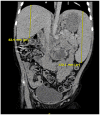The Diagnostic Saga of a Rare Congenital Bile Acid Synthesis Disorder: A Case Report
- PMID: 40809789
- PMCID: PMC12344235
- DOI: 10.1177/11795565251340558
The Diagnostic Saga of a Rare Congenital Bile Acid Synthesis Disorder: A Case Report
Abstract
Congenital bile acid synthesis disorder type 1 is an extremely rare disease with around 100 cases identified worldwide. Diagnosis remains challenging for pediatricians in view of the non-specific, variable clinical presentations of cholestasis, fat malabsorption, and liver cirrhosis. Early diagnosis and therapy with cholic acid are crucial to reverse the hepatopathy and prevent fatal outcomes. This paper sheds light on the diagnostic challenges of congenital bile acid synthesis disorder type 1 in a patient with an unusual presentation and a previously unreported mutation in the HSD3B7 gene. Moreover, this report aims to increase awareness of this treatable disorder among pediatricians. A 4-year-old child presented to our Medical Center with splenomegaly, fever, multiple lymphadenopathies, and mild cholestasis without hepatomegaly. History was remarkable for recurrent infections since the age of 3 years. Differential diagnosis included viral infections, malignancies, and inherited metabolic disorders. After an extensive negative work-up, genetic testing by next-generation sequencing identified a previously unreported homozygous disease-causing variant in the HSD3B7 gene, confirming the diagnosis of congenital bile acid synthesis disorder type 1. Suggestive abnormal urinary bile acids metabolites were also identified. Bile acid replacement therapy was initiated with reversal of cholestasis. This case highlights an unusual phenotypic presentation and the diagnostic challenges of an extremely rare disorder of bile acid synthesis. An increased awareness among pediatricians and the use of next-generation sequencing as a first-tier test in the setting of non-specific clinical presentations may shortcut the list of extensive investigations, allowing an early diagnosis of such treatable disorders, thus improving the patients' outcomes.
Keywords: HSD3B7 gene; bile acid synthesis disorder; case report; cholic acid; exome sequencing.
© The Author(s) 2025.
Conflict of interest statement
The author(s) declared no potential conflicts of interest with respect to the research, authorship, and/or publication of this article.
Figures
Similar articles
-
Prescription of Controlled Substances: Benefits and Risks.2025 Jul 6. In: StatPearls [Internet]. Treasure Island (FL): StatPearls Publishing; 2025 Jan–. 2025 Jul 6. In: StatPearls [Internet]. Treasure Island (FL): StatPearls Publishing; 2025 Jan–. PMID: 30726003 Free Books & Documents.
-
SeHCAT [tauroselcholic (selenium-75) acid] for the investigation of bile acid malabsorption and measurement of bile acid pool loss: a systematic review and cost-effectiveness analysis.Health Technol Assess. 2013 Dec;17(61):1-236. doi: 10.3310/hta17610. Health Technol Assess. 2013. PMID: 24351663 Free PMC article.
-
Sexual Harassment and Prevention Training.2024 Mar 29. In: StatPearls [Internet]. Treasure Island (FL): StatPearls Publishing; 2025 Jan–. 2024 Mar 29. In: StatPearls [Internet]. Treasure Island (FL): StatPearls Publishing; 2025 Jan–. PMID: 36508513 Free Books & Documents.
-
Expanding the genotypic spectrum of 3β-hydroxy-δ5-C27-steroid dehydrogenase (HSD3B7) deficiency: novel mutations and clinical outcomes.J Pediatr Endocrinol Metab. 2025 Jan 14;38(5):546-550. doi: 10.1515/jpem-2024-0454. Print 2025 May 26. J Pediatr Endocrinol Metab. 2025. PMID: 39803807
-
Signs and symptoms to determine if a patient presenting in primary care or hospital outpatient settings has COVID-19.Cochrane Database Syst Rev. 2022 May 20;5(5):CD013665. doi: 10.1002/14651858.CD013665.pub3. Cochrane Database Syst Rev. 2022. PMID: 35593186 Free PMC article.
References
-
- Al-Hussaini AA, Setchell KDR, AlSaleem B, et al. Bile acid synthesis disorders in Arabs: a 10-year screening study. J Pediatr Gastroenterol Nutr. 2017;65(6):613-620. - PubMed
-
- Jahnel J, Zöhrer E, Fischler B, et al. Attempt to determine the prevalence of two inborn errors of primary bile acid synthesis: results of a European survey. J Pediatr Gastroenterol Nutr. 2017;64(6):864-868. - PubMed
-
- Heubi JE, Setchell KDR, Bove KE. Inborn errors of bile acid metabolism. Clin Liver Dis. 2018;22(4):671-687. - PubMed
Publication types
LinkOut - more resources
Full Text Sources




